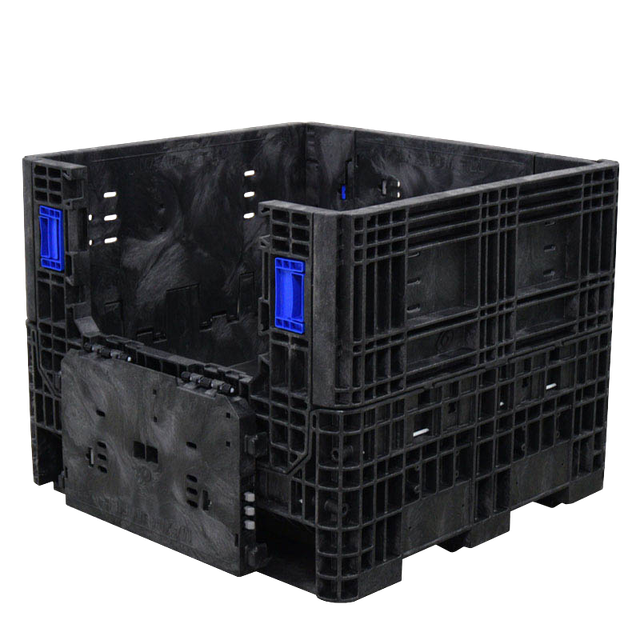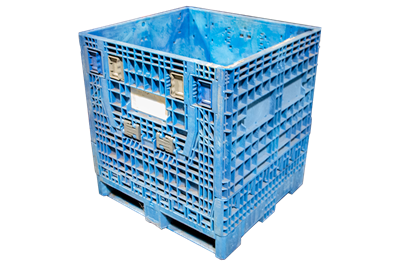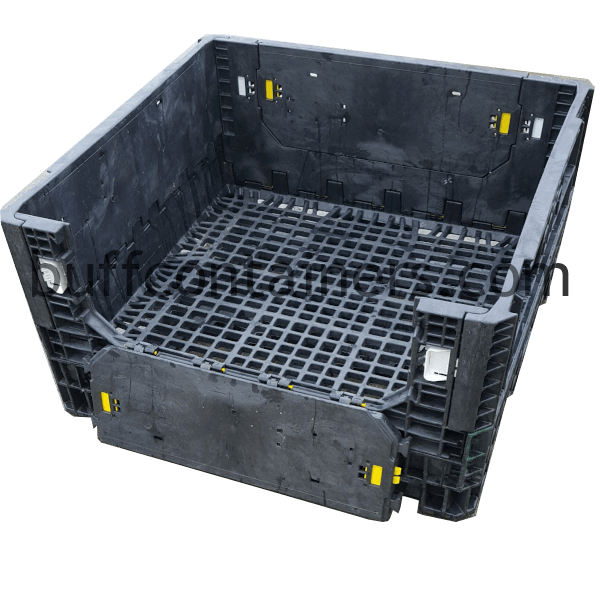A Comprehensive Guide to the Different Sorts Of Mass Plastic Containers Available Today
Mass plastic containers play an essential duty in numerous industries, providing services for storage and transportation. Their diverse types satisfy various demands, from stiff alternatives for solid materials to adaptable containers suiting numerous forms. Each type presents distinct benefits, making it vital to comprehend their functions and applications. As industries advance, so do the needs for efficient container options. What variables should one take into consideration when selecting the ideal bulk container?
Introduction of Mass Plastic Containers

Sorts Of Bulk Plastic Containers
Mass plastic containers can be found in various kinds, each suited to certain applications. Stiff bulk containers, flexible mass containers, and intermediate bulk containers represent the primary classifications, each offering distinct benefits. Comprehending these types is important for choosing the appropriate container for transferring and saving materials.

Stiff Mass Containers
Stiff mass containers are vital for efficient storage space and transport of different materials across sectors. These containers are typically constructed from durable plastics, enabling them to hold up against rough handling and environmental problems. They can be found in different sizes and shapes, including containers, drums, and totes, making them appropriate for keeping every little thing from granular substances to liquids. Stiff containers usually feature enhanced wall surfaces and secure lids, making sure the materials stay protected throughout transportation. Their stackable style optimizes storage area, making them ideal for stockrooms and producing facilities. In addition, many rigid bulk containers are multiple-use and recyclable, adding to sustainability initiatives. On the whole, their robustness and versatility make rigid mass containers a crucial component in supply chain procedures.
Versatile Bulk Containers
Flexible bulk containers, typically referred to as versatile intermediate bulk containers (FIBCs), work as a flexible remedy for storing a range and delivering of dry products. These containers are commonly made from woven polypropylene and are developed to be light-weight yet strong, enabling efficient handling and stacking. Their flexibility allows them to accommodate numerous shapes and sizes, making them suitable for items varying from grains to chemicals. FIBCs can be equipped with attributes such as spouts for simple filling and discharge, in addition to protective finishings for boosted toughness. Furthermore, they are recyclable and recyclable, contributing to lasting techniques in industries like agriculture, food handling, and construction. Overall, flexible mass containers supply a efficient and affordable choice for mass product administration.
Intermediate Bulk Containers
Intermediate bulk containers (IBCs) are necessary for the efficient transportation and storage of liquids and granular products throughout different sectors. These containers usually have a capacity varying from 275 to 330 gallons and are designed for simple dealing with and piling. Made from long lasting materials like high-density polyethylene or steel, IBCs supply superb defense against contamination and environmental variables. Their design includes functions such as a built-in pallet for forklift gain access to and a detachable top for very easy filling and cleaning. IBCs are commonly made use of in chemical, food, and pharmaceutical markets, ensuring compliance with security guidelines. Their convenience and reusability make them a cost-efficient option for bulk storage space and transportation, adding to supply chain efficiency and sustainability.
Features and Advantages of Mass Plastic Containers
Bulk plastic containers are important tools in different sectors, using a combination of toughness and practicality. These containers are constructed from high-grade products, making them resistant to influences, chemicals, and ecological elements. This toughness guarantees product safety and security throughout storage and transportation.
In addition, mass plastic containers are light-weight, promoting ease of managing and minimizing delivery costs. Their stackable design makes the most of storage space performance, permitting maximized stockroom area. Several models include secure covers or closures, providing a closed seal that protects against and preserves contents contamination.
Bulk plastic containers are recyclable and often multiple-use, contributing to sustainable practices. Their flexibility enables a vast array of applications, from food storage to industrial usage, improving their value across industries. Organizations benefit from the lengthy lifespan and low upkeep needs of these containers, making them an affordable remedy for both lasting and short-term requirements.
Industries That Use Mass Plastic Containers
Different sectors profit from making use of bulk plastic containers, each leveraging their special buildings for certain applications. The food and beverage industry depends on these containers for risk-free storage and transportation of items, while the chemical production industry uses them for taking care of harmful materials. Additionally, the pharmaceutical circulation requires emphasize the relevance of longevity and tidiness in packaging solutions.
Food and Beverage Sector
As the demand for secure and reliable storage solutions proceeds to climb, the food and drink industry progressively relies upon bulk plastic containers for their operational requirements. These containers provide durable, light-weight, and functional options for storing components, completed items, and waste products. Made from food-grade products, they ensure compliance with health and wellness and safety requirements. Various designs, such as stackable containers and lug boxes, maximize space during transportation and storage, improving logistical performance. In addition, the openness of some bulk containers enables easy inventory management, lowering the danger of spoilage. With the market's focus on sustainability, several producers are currently using multiple-use and recyclable choices, aligning with eco-friendly methods while fulfilling the high demands of food safety and security and health.
Chemical Manufacturing Market
The chemical manufacturing sector depends heavily on mass plastic containers for the risk-free and effective storage space of raw materials, intermediates, and finished items. These containers are designed to hold up against various chemicals, ensuring that hazardous materials do not leakage or degrade the container itself. Typical kinds consist of high-density polyethylene (HDPE) and polypropylene containers, which offer exceptional chemical resistance and durability. Their lightweight nature and stackable design help with transportation and storage, enhancing room in manufacturing facilities. Furthermore, numerous bulk plastic containers include attributes such as tamper-evident seals and easy-to-read labeling, boosting safety and compliance with industry guidelines. Generally, bulk plastic containers are essential to the chemical production procedure, providing dependable services for managing diverse materials.
Pharmaceutical Circulation Demands
Pharmaceutical distribution relies upon bulk plastic containers to satisfy rigid security and regulatory demands. These containers are investigate this site vital for keeping a selection and moving of pharmaceutical items, consisting of active pharmaceutical components (APIs) and finished drugs. Their layout warranties protection versus light, contamination, and wetness, keeping the integrity of sensitive materials. Furthermore, mass plastic containers are compliant with sector requirements such as Good Production Practices (GMP) and are typically made from materials that are FDA-approved. Making use of these containers improves effectiveness in the supply chain, enabling for safe, large circulation while minimizing waste. Companies in the pharmaceutical sector focus on the use of durable, leak-proof, and tamper-evident containers to ensure item safety and quality throughout the logistics process.
Considerations for Selecting the Right Container
When selecting the ideal mass plastic container, different aspects need to be very carefully weighed to ensure ideal capability and safety and security. The nature of the products to be kept is extremely important; compatibility with the container's material can influence stability and security. bulk plastic containers for sale. In addition, the container's shapes and size have to line up with the storage and transport demands, assuring efficient room usage
Lots capacity is another essential consideration, as it needs to suit the weight of components without danger of damages or failing. The design attributes, such as airing vent or covers, can impact usability and accessibility. Conformity with industry regulations is important, especially in fields like pharmaceuticals, where safety standards are rigorous.
The expected life-span and toughness of the container ought to be examined to validate it fulfills the operational requirements without regular substitute. By examining these variables, one can select the most appropriate mass plastic container for particular applications.
Ecological Effect and Sustainability
As services significantly focus on sustainability, the ecological impact of bulk plastic containers has actually come under scrutiny. These containers, commonly made from materials such as polyethylene or polypropylene, add substantially to plastic waste otherwise managed correctly. Their production involves the intake of nonrenewable fuel sources, which can result in enhanced greenhouse gas emissions. Innovations in reusing technology and the advancement of biodegradable alternatives are assisting to minimize these concerns.
Furthermore, many suppliers are embracing techniques that emphasize using recycled products, therefore decreasing the demand for virgin plastics. The sturdiness of mass plastic containers also plays a role; they are developed to be reused numerous times, which can lessen their total ecological impact when compared to single-use options. Inevitably, the industry deals with the challenge of balancing functionality with environmental responsibility, making sustainable methods crucial for the future of mass plastic containers.
Finest Practices for Storage and Transportation
Reliable storage space and transportation of bulk plastic containers substantially influence both operational performance and sustainability. To maximize space, organizations must stack containers firmly, guaranteeing stability and protecting against damage. Appropriate labeling is necessary for very easy recognition, which improves retrieval processes. Additionally, keeping a clean and organized storage space area minimizes the threat of contamination and improves safety.
For transportation, choosing the ideal car is important; containers need to be secured to avoid moving during transportation. Companies must likewise take into consideration using pallets to promote less complicated loading and discharging. Routine assessments of containers for damage can protect against costly replacements.
Temperature level control is an additional crucial facet, as extreme problems can compromise the stability of the plastic. Ultimately, training employees on best techniques for managing and transportation warranties conformity and advertises a culture of security. By see here now applying these finest techniques, services can boost their functional effectiveness while adding to ecological sustainability.
Regularly Asked Concerns
Exactly how Do I Clean Mass Plastic Containers Successfully?
To clean bulk plastic containers properly, one must rinse them with cozy water, use a light detergent and scrub with a soft brush. Wash completely, then allow to air completely dry entirely before storage or reuse.
What Is the Life-span of Mass Plastic Containers?
The life expectancy of mass plastic containers generally varies from 5 to one decade, depending upon the product, usage, and environmental conditions. Appropriate upkeep and storage can substantially expand their functionality and durability gradually.
Can Mass Plastic Containers Be Personalized?

Do Bulk Plastic Containers Have Service Warranty Options?

Are There Regulations for Using Bulk Plastic Containers?
Yes, laws exist for using bulk plastic containers, mostly concentrated on safety, ecological effect, and material conformity. These laws guarantee that containers meet industry requirements and appropriate for transferring numerous materials safely and successfully.
Inflexible bulk containers, versatile bulk containers, and intermediate mass containers represent the primary categories, each offering unique advantages. Flexible bulk containers, often referred to as versatile intermediate bulk containers (FIBCs), serve as a flexible option for carrying and saving a variety of completely dry products. The chemical manufacturing market counts heavily on mass plastic containers for the efficient and safe storage space of raw products, intermediates, and completed items. Bulk Plastic Containers. These containers are developed to stand up to various chemicals, guaranteeing that hazardous materials do not leakage or weaken the container itself. Additionally, mass plastic containers are compliant with market criteria such as Great Production Practices (GMP) and are usually made from products that are FDA-approved